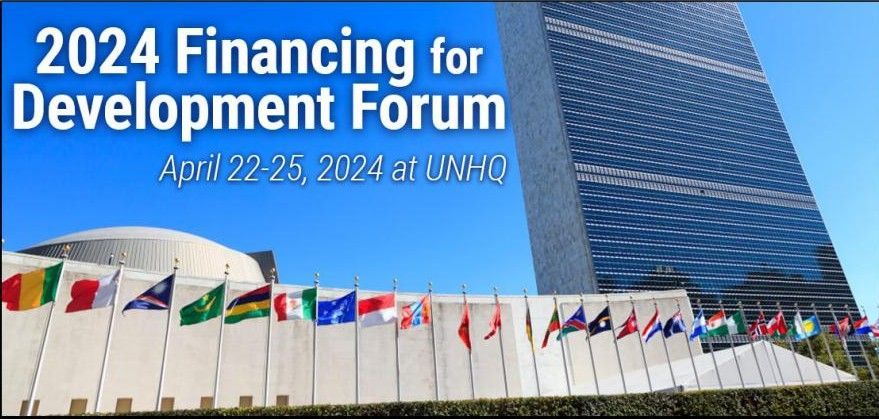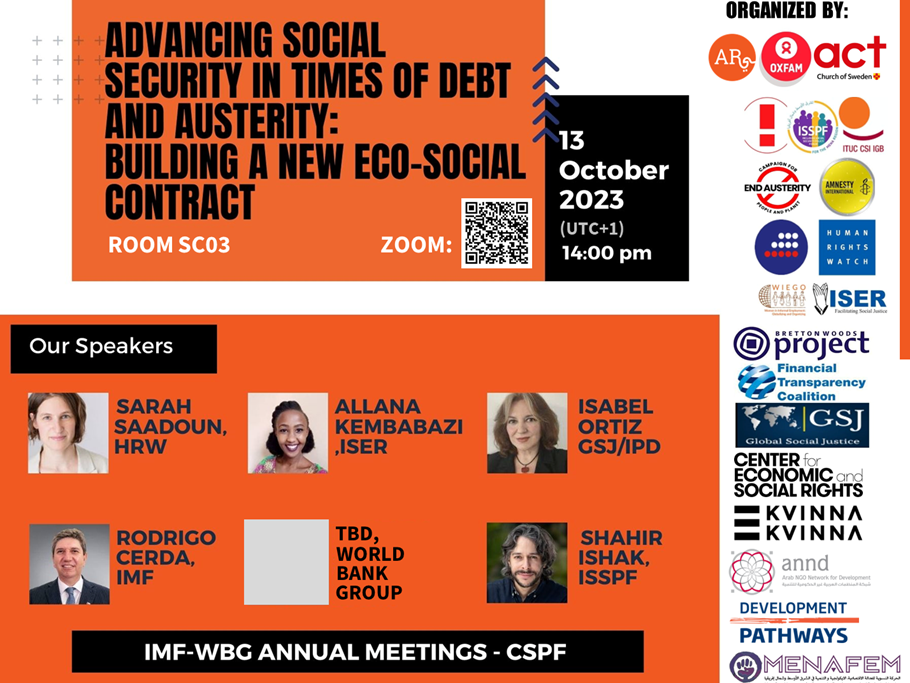Conferences & Events
Public Services for Social Development: Time for a New Eco-Social Contract
November 6, 2025
Second World Summit for Social Development (WSSD2), Doha Qatar
Universal access to high-quality public services is the backbone of a fair and sustainable development and the realization of human rights. The session
advanced a rights-based
new social contract for public services, showcased proven solutions and positive country examples, as well as highlighting
false solutions,
in support of a new social contract for increased
public investment/finance and focus in public services with deliberative steps from governments, multilateral institutions, and civil society.

Financing alternatives to budget cuts to invest in universal social protection and public services
July 2, 2025
4th International Conference on Financing for Development (FfD4) Sevilla
The event showed how austerity cuts and privatization must be avoided as there are options to finance development goals and human rights even in the poorest countries, presenting successful country cases of progressive taxation, tackling illicit financial flows, reducing debt and other critical areas discussed at the 4th FfD Conference.

Reclaiming Financing for Gender Justice and Structural Transformation: A High-Level Feminist Event
July 1, 2025
4th International Conference on Financing for Development (FfD4) Sevilla
At this UN FfD4 high level side event members of civil society, academics, and experts highlighted that current financing frameworks deepen inequalities by prioritizing debt repayment, austerity, financing of wars and defunding of social protection, as well as private finance over public goods, thereby worsening women’s unpaid care burdens and undermining decent work -calling for forward-looking progressive policies for gender justice.

The Social and Commercial Determinants of Mental Health
May 20, 2025
World Health Assembly, United Nations, Geneva
Panel at the World Health Assembly organized by the Global Mental Health Action Network and the World Federation of Public Health Associations. UN-Geneva Representative Odile Frank addressed the psychological aspects of multilateral social development policy and the global development agenda, highlighted the impact of our environments – and corporate interests – on mental health.

Austerity vs. Protection: Labor's Perspective on the IMF's Contradictory Social Spending Approach
April 22, 2025
IMF/WB SpringMeetings Side Event, Washington D.C.
The session presented a trade union global survey on IMF impact on social policy, as well as the study
End Austerity: A Global Report on Budget Cuts and Harmful Social Reforms in 2022-25 by GSJ and CSOs, exposing the negative social impacts of austerity and the tensions between fiscal consolidation and sustainable goals. Panelists explored alternative approaches, including nine financing options available to governments to avoid austerity and prioritize the working and the middle classes, reducing inequality and promoting social cohesion.

G20 Social Protection Workshop
October 22, 2024
Government of South Africa/G20 and SPI, Pretoria
This workshop, organized by the Government of South Africa assisted by the Social Policy Initiative (SPI), focused on the policy priorities for the G20 Development Working Group under the South African presidency: Financing for development, with a focus on Illicit Financial Flows, and
Social Protection Floors and Global Public Goods.

UN Joint Meeting of the Second Committee of the UN General Assembly and the Economic and Social Council "Fostering resilience and growth in an uncertain world"
October 15, 2024
United Nations, New York
Keynote Statement addressing the different aspects of the current polycrisis. In particular, the cost-of-living crisis with austerity cuts, result in hard social impacts, specially on women,
universal social protection is much needed. Traditionally, governments fought crisis with strong public policies, but today
fiscal austerity results in minimal budgets and governments are unable to properly respond. The presentation showed that governments have many
alternatives to finance development and the SDGs.

Justicia Social y Arquitectura Financiera Internacional
June 25, 2024
Side event del IV Seminario Regional de Desarrollo Social
UN ECLAC/CEPAL, Santiago de Chile
Regional ministerial high-level conference preparing for the Second World Social Summit in 2025. The presentation focused on the need for ambitious goals at the World Social Summit, rather than the
austerity prescriptions of the last decades. This is a world awash in money and with high inequality, there are many feasible financing options to invest in human rights, sustainable development and social justice. There are at least eight
financing options, such as increasing progressive tax revenues, fighting illicit financial flows or reducing debt, among others.

UN Expert Meeting on Financing Social Protection and Public Services in preparation of FfD4
and Financing for Development Forum
22-25 April 2024
United Nations, New York
Member of the UN Expert Meeting on Financing
Social Protection and
Public Services in preparation of the Fourth International Conference on Financing for Development in 2025 (several meetings from April to June 2024) and participant at the 2024 Financing for Development Forum as part of the Civil Society FfD Mechanism.

World People's Economic Forum
February 18, 2024
World Social Forum, Kathmandu
The World People's Economic Forum 2024 was developed to counterbalance the elitism of the World Economic Forum, that fosters the influence of the corporate world among governments in the luxury ski resort of Davos. Speakers in the People’s Forum included former UN Assistant Secretary-General Jomo K. Sundaram, Oxfam Executive Secretary Amitabh Behar, and Global Social Justice’s Isabel Ortiz among others, focused on challenging the neoliberal idea that “there is no alternative”; instead affirming that “another world is possible” built upon peace, human rights, real democracy, justice, equity and development for all.

End Austerity: There are Alternatives
February 17, 2024
World Social Forum, Kathmandu
This session at the World Social Forum, organized by Global Social Justice, Financial Transparency International, Oxfam and SouthAsian Dialogues on Ecological Democracy, presented the negative social impacts of austerity cuts, particularly on women, and focused on the many financing alternatives available to governments to achieve socially fair outcomes and sustainable development objectives.

Advancing Social Security in Times of Debt and Austerity: Building a New Eco-Social Contract
October 13, 2023
IMF/World Bank Annual Meetings Side Event, Marrakech
Recent research (for instance, by Oxfam, GSJ, and HRW) analyzing IMF programs show that, far from “mitigating” austerity measures, IMF social spending floors, fail to address the systemic negative impacts of their policy conditionalities, thus exacerbating inequalities. As an alternative approach, the panel explored how the World Bank and IMF could conceive their interventions not just as technical safety nets for the poor, but as an effort to support human rights within a new eco-social contract. Watch
video of the session.

'End Austerity! Reclaim the Right to Education, Health and Social Security'
October 8, 2023
Reclaim our Future Conference, Marrakech
This session presented the evidence about the new austerity policies, affecting more than 6 billion people. Which are these new policies? Where are they being implemented, and at what human cost? And which are the feasible alternatives that countries can apply to end austerity? Key facts and messages from reports by ActionAid International, Financial Transparency Coalition, Human Rights Watch, OXFAM and Global Social Justice with many other CSOs.

How Governments Can Respond to the Cost-of-Living Crisis
April 13, 2023
Headquarters AFL-CIO Washington, D.C.
This seminar organized by the International Trade Union Confederation (ITUC/AFL-CIO), the Friedrich-Ebert-Stiftung, the Initiative for Policy Dialogue and Global Social Justice, aims to bring researchers together with representatives from the IMF, World Bank, governments, think tanks, trade unions and wider civil society to discuss the current crisis/protests and how governments can respond to it, with concrete proposals for short and medium term actions to address the ongoing cost of living crisis.

Avoiding Austerity in a Time of Compounding Crises
October 12, 2022
IMF/WB Annual Meetings Side Event, Washington D.C.
Governments are facing a disrupted recovery due to the spread of new Omicron variants, the impacts of the Ukraine war, surging inflation and interest rates and increased risk of debt distress. Expansionary recovery fiscal policies are turning into fiscal consolidation in most countries and spending in essential public services is threatened. The session presented new 2022 reports by Global Social Justice, Financial Transparency Coalition, OXFAM and Eurodad, showing fiscal consolidation trends and inequalities in recovery policies that are harming public services, people and the planet.

The interlinked global crises from an Arab perspective
15 July 2022
UN High Level Political Forum Side Event, New York
The 2022 UN Secretary General Progress Report recognizes that the interlinked global crises, namely the COVID-19 pandemic, the climate crisis and the impacts of the conflict in Ukraine is putting the achievement of the SDGS at great risk. Accordingly the report emphasizes the need for a new social contact to rebuild trust, solve shared problems, manage risks and pool resources to deliver global public goods. See
here.

Global Justice to Achieve the SDGs: Sustainable Equality for All
20-22 September 2022
Global People’s Assembly, New York
We the People are 1,300 civil society participants from 127 countries representing diverse, excluded and marginalized people, testifying to the current state of injustice as global leaders gathered for the 77th session of the UN General Assembly (UNGA) concerned that, at the current pace, unless there is radical change, the world will not meet its 2030 SDG commitments. Speakers included. among others, G. Bucher, ED from OXFAM and I. Ortiz, ED from Global Social Justice.

The right to social security in the changing world of work
1 November 2021
United Nations Human Rights Council, Geneva
The panel discussion examined how the normative content of the right to social security and the corresponding human rights obligations of States can guide policy making at the national and international level in advancing the enjoyment of this right. The COVID-19 crisis has made realizing this right even more urgent by exposing the weaknesses of a social and economic system that has neglected to invest sufficiently in fundamental public services such as social protection and health care, unveiling gaps in coverage, inadequacy of social protection benefits and exacerbating deep-seated inequalities.
See here.

SDG 16 Conference: People-centered Governance in a Post-Pandemic World
21-22 April 2022
United Nations, Rome
The Conference explored how a people-centred approach to governance can help rebuild trust, accelerate progress towards sustainable development and tackle the challenges facing a post-Covid world. Speakers included Isabel Ortiz from Global Social Justice.

Building Back Fairer: Equality in a Post-COVID World
8 July 2021
UN High Level Political Forum Side Event, New York
A panel of experts discussed what entrenched inequalities
cost us and how the COVID-19 crisis has exacerbated them. Experts examined the threats posed to our societies, economies and our human rights by the current situation and
discuss how this could be a critical inflection point for creating more equal, inclusive and sustainable economies and societies. Speakers:
- Winnie Byanyima, Executive Director of UNAIDS and an Under-Secretary-General of the United Nations
- Jayati Ghosh, Professor of Economics at the University of Massachusetts at Amherst
- Isabel Ortiz, Director Global Social Justice
- Max Lawson, Head of Inequality Policy at Oxfam

Fiscal Space for Universal Health and Social Protection after the COVID19 Pandemic: How to Prevent Austerity
October 2, 2020
IMF/WB Annual Meetings Side Event, Washington D.C.
In 2020 governments have financed emergency care and urgent socioeconomic support to cope with COVID19. While this short-term expending was necessary, countries must also continue to invest in long-term universal health, social protection systems/floors and other SDGs. Adjustment cuts to social programs are not feasible; governments must look at progressive taxation, eliminating illicit financial flows and other revenue policies. The session, organized by Global Social Justice and others, explored all the equitable options available to countries to expand fiscal space to achieve the SDGs.

